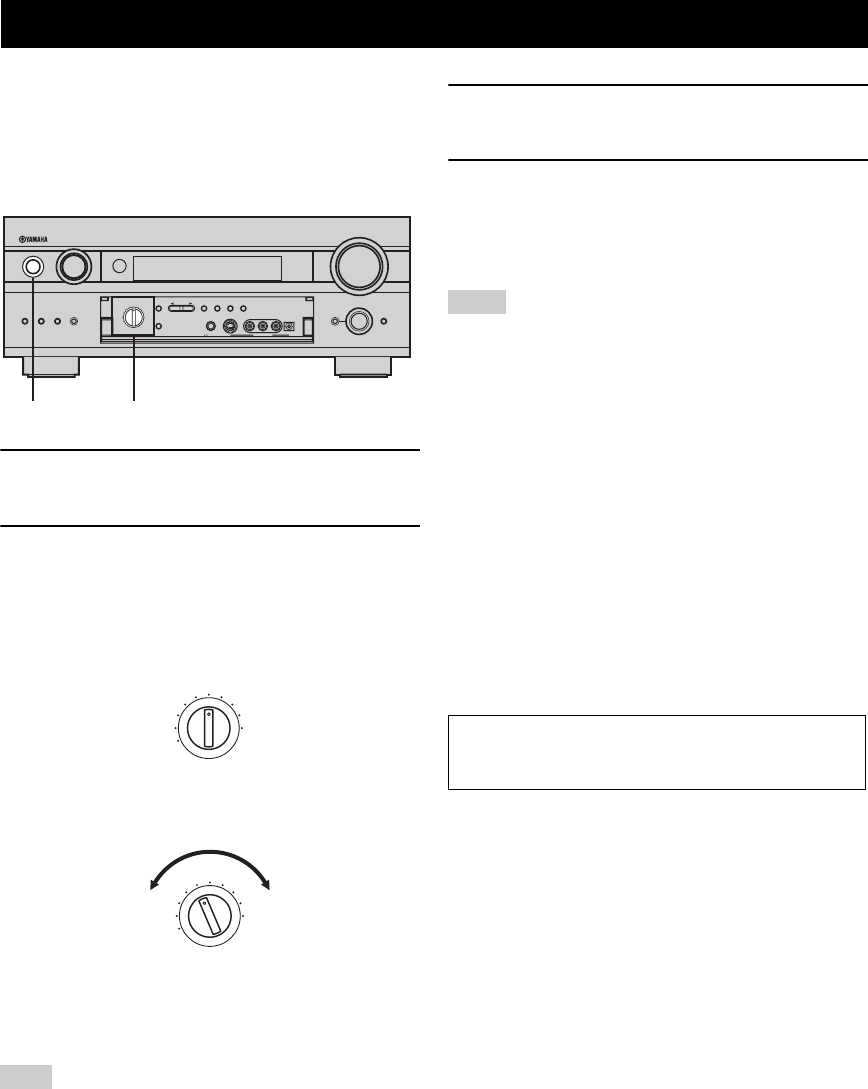
RECORDING
40
You can use the REC OUT/ZONE 2 or REC OUT control
to record one source while watching and/or listening to
another source.
Recording adjustments and other operations are
performed from the recording components. Refer to the
operation instructions for those components.
1 Turn on the power of this unit and all
connected components.
2 Select the source component you want to
record from by using REC OUT/ZONE 2 or
REC OUT.
• To record the current input source that you are
watching or listening to, set REC OUT/ZONE 2 or
REC OUT to SOURCE/REMOTE.
• To record a source other than the one that you are
watching or listening to, set REC OUT/ZONE 2 or
REC OUT to the source you want to record.
After this setting, you can change the source you
are listening to and/or watching without effecting
the recording by rotating INPUT (or pressing one
of the input selector buttons on the remote control).
The source you record and the source sent to Zone 2 (U.S.A.,
Canada and Australia models only) are always the same.
3 Start playback (or select a broadcast station)
on the source component.
4 Start recording on the recording component.
y
To record audio and video from different sources, set REC OUT/
ZONE 2 or REC OUT to SOURCE/REMOTE, select a video
source first then select an audio source (see page 31).
• Do a test recording before you start an actual recording.
• When this unit is set in the standby mode, you cannot record
between other components connected to this unit.
• The setting of TONE CONTROL, VOLUME, “Speaker level”
(page 50) and programs does not affect the recorded material.
• A source connected to the MULTI CH INPUT jacks of this unit
cannot be recorded.
• S-video and composite video signals pass independently
through this unit’s video circuits. Therefore, when recording or
dubbing video signals, if your video source component is
connected to provide only an S-video (or only a composite
video) signal, you can record only an S-video (or only a
composite video) signal to your VCR.
• A given input source is not output on the same REC OUT
channel. (For example, the signal input from VCR 1 IN is not
output on VCR 1 OUT.)
• Check the copyright laws in your country to record from
records, CDs, radio, etc. Recording of copyrighted material may
infringe copyright laws.
■ Special considerations when recording
DTS software
The DTS signal is a digital bit stream. Attempting to
digitally record the DTS bit stream will result in noise
being recorded. Therefore, if you want to use this unit to
record sources that have DTS signals recorded on them,
the following considerations and adjustments need to be
made.
For LDs, DVDs and CDs encoded with DTS, when your
player is compatible with the DTS format, follow its
operation instruction to make a setting so that the analog
signal will be output from the player.
RECORDING
Note
VOLUME
VIDEO AUXSILENT
REC OUT
/ZONE 2
SPEAKERS
INPUT
MULTI CH
INPUT
INPUT MODE
PRESET
/
TUNING
PHONES
SOURCE
/REMOTE
MD/TAPE
CD–R
TUNER
CD
DVD
D–TV
CBL/SAT
VCR 1
/VCR2
DVR
A/B/C/D/E
S VIDEO
MEMORY
FM/AM
EDIT
PRESET
/TUNING
MAN'L/AUTO FM AUTO/MAN'L MONO
TUNING
MODE
VIDEO AUDIO OPTICALLR
STANDBY
/
ON
A B
OPTIMIZER
MIC
TONE CONTROL
PROGRAM
STRAIGHT
EFFECT
EON PTY SEEK
MODE START
RDS MODE
/FREQ
21
(U.S.A. model)
SOURCE
/REMOTE
REC OUT/ZONE 2
MD/TAPEDVD
DTV
CBL/SAT
VCR 1
CD-R
TUNER
CD
DVR
/VCR2
SOURCE
/REMOTE
REC OUT/ZONE 2
MD/TAPEDVD
DTV
CBL/SAT
VCR 1
CD-R
TUNER
CD
DVR
/VCR2
Notes
If you playback a video source that uses scrambled or
encoded signals to prevent it from being dubbed, the
picture itself may be disturbed due to those signals.
00_RX-V2400U_EN.book Page 40 Friday, October 10, 2003 10:54 AM


















